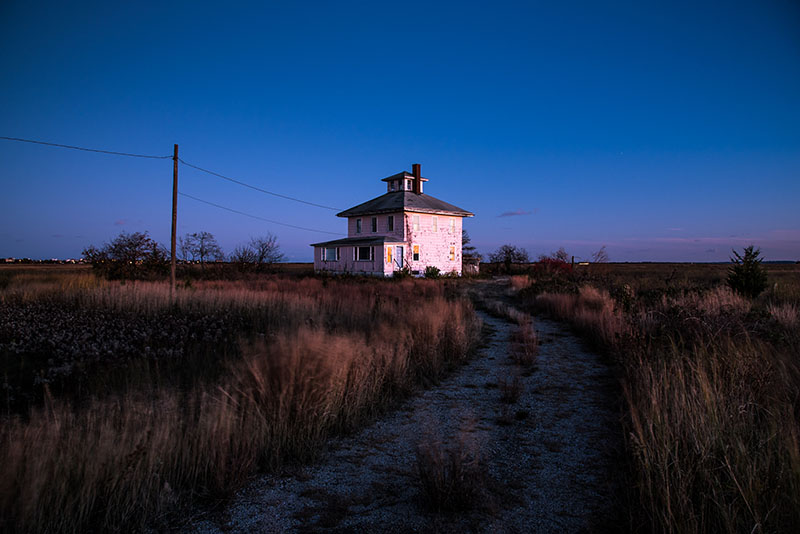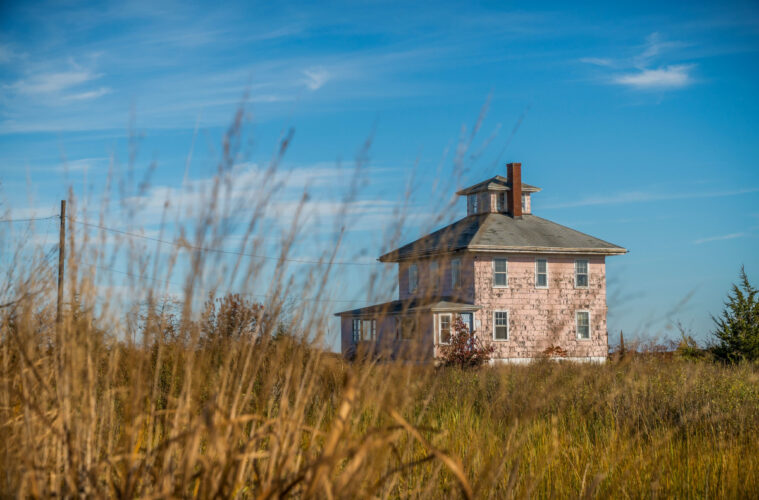Newbury’s iconic Pink House was built in 1925, making next year its 100th birthday. But it is becoming increasingly uncertain whether it will see its centennial.
The U.S. Fish and Wildlife Service announced yesterday that it intends to remove the Plum Island house, either demolishing it or selling it for relocation or salvage. Local activists from the nonprofit Support the Pink House received the news with a mix of shock, heartbreak, and determination to continue their efforts to save the landmark.
“We just need to keep fighting in whatever way we can,” says board member Alison Odle.
U.S. Fish and Wildlife Service, however, declares that its decision is firm. The house, it said, floods frequently, contains asbestos, and is in a dangerous state of disrepair that makes it unsafe to use or even to enter for renovations.
“This was a difficult decision,” says Matthew Hillman, the U.S. fish and Wildlife refuge manager who oversees the property. “But it really is in the best interest of the health of the salt marsh and the wildlife.”
The Pink House is a two-story, three-bedroom home located on the Plum Island Turnpike. It is known as much for its rosy hue as for its isolated location, surrounded by expanses of salt marsh on all sides. It is a striking sight that has long attracted visitors, inspired artists, and given rise to local legends. The house changed hands many times over the years, before the U.S. Fish and Wildlife Service, which also manages the adjacent Parker River National Wildlife Refuge, bought the property – the house along with nine acres of surrounding marsh and tidal creek – for $375,000 in 2011.

The house, already in disrepair when it was bought, continued to deteriorate. Asbestos was discovered in 2014, and local vandals have done yet more damage. Even maintaining structural stability has become costly and time-consuming, the agency said.
Together, these factors led to the decision that removing the house would be the best way to support the agency’s mission of protecting natural lands and wildlife. When the house is gone, a small parking lot with bench and education signage will be installed in the location, the announcement said.
The agency must now determine whether the house can be put up for public auction. If so, Hillman says, the rough timeline would be for the auction to be completed by late summer. If not, plans will be laid for the demolition of the house, which will cost an estimated $50,000 to $90,000, according to the announcement.
Keeping up the fight
Members of Support the Pink House, however, argue that more could have been done to preserve the building. Though U.S. Fish and Wildlife is not legally allowed to sell public land, it would have been allowed to swap the land for a parcel of equal monetary and ecological value. Though there were several promising leads, none were quite right, Hillman says.
“It became apparent that this is not a good fit for a land exchange,” he says. “That has not materialized.”
However, Support the Pink House says it brought forth at least 15 viable options for a land swap, yet none were accepted by the agency. Group members expressed skepticism that none of those parcels were appropriate.
“I am 100% sure that this could be accomplished,” says Rochelle Joseph, president of the group.
Others argued the government should have given more weight to the economic and cultural value they say the house offers the region. Of the 396 comments received on the case by U.S. Fish and Wildlife, 78% were in favor of keeping the house in place, a number supporters say testifies to the importance the building has in the region. They note that tourists come to see the house, bringing money into the local economy and question whether a parking lot with scenic views would do much for people or the marsh.
Support the Pink House, which has more than 3,000 followers on Facebook and has rallied thousands of signatures on petitions to preserve the house, urges people who care about the house to take action. They ask supporters to contact U.S. Fish and Wildlife, as well as the offices of Sen. Elizabeth Warren, Sen. Ed Markey, and Rep. Seth Moulton.
They group is also holding a meeting on April 4 at 7 p.m. at PITA Hall in Newbury and encourages people to attend as the organization plans the next steps in its fight.
“We just don’t know why this happening, and we know that there’s still options,” Joseph says. “We aren’t going to give up – we’ve got the weight of thousands of people on our shoulders.”

